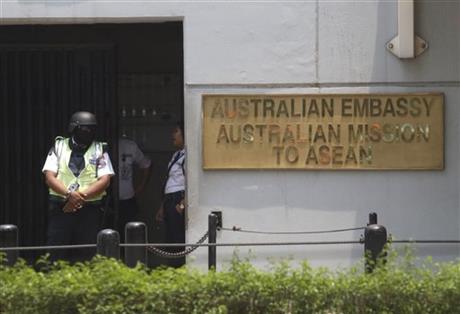By KRISTEN GELINEAU
Security officers stand guard at the Australian Embassy in Jakarta, Indonesia, Jakarta, Indonesia, Friday, Nov. 1, 2013. Australia’s ambassador met with Indonesian government officials who summoned him Friday following reports the Australian Embassy in Jakarta is a hub for Washington’s secret electronic data collection program. (AP Photo/Dita Alangkara)
Indonesia Australia Asia US Spying
Australian Ambassador to Indonesia Greg Moriarty, front, arrives at Indonesian Foreign Ministry in Jakarta, Indonesia as he is being summoned Friday, Nov. 1, 2013. China and Southeast Asian governments demanded an explanation from the U.S. and its allies following media reports that American and Australian embassies in the region were being used as hubs for Washington’s secret electronic data collection program. (AP Photo/Achmad Ibrahim)
Indonesia Australia Asia US Spying
Australian Ambassador to Indonesia Greg Moriarty, front, arrives at Indonesian Foreign Ministry in Jakarta, Indonesia as he is being summoned Friday, Nov. 1, 2013. China and Southeast Asian governments demanded an explanation from the U.S. and its allies following media reports that American and Australian embassies in the region were being used as hubs for Washington’s secret electronic data collection program. (AP Photo/Achmad Ibrahim)
Indonesia Asia US Spying
Security officers stand guard at the Australian Embassy in Jakarta, Indonesia, Jakarta, Indonesia, Friday, Nov. 1, 2013. Australia’s ambassador met with Indonesian government officials who summoned him Friday following reports the Australian Embassy in Jakarta is a hub for Washington’s secret electronic data collection program. (AP Photo/Dita Alangkara)
Prev
1 of 4
Next
SYDNEY (AP) — Australia’s ambassador met with Indonesian government officials who summoned him Friday following reports the Australian Embassy in Jakarta is a hub for Washington’s secret electronic data collection program.
A document from National Security Agency leaker Edward Snowden, published this week by German magazine Der Spiegel, describes a signals intelligence program called “Stateroom” in which U.S., British, Australian and Canadian embassies house surveillance equipment to collect electronic communications. Those countries, along with New Zealand, have an intelligence-sharing agreement known as “Five Eyes.”
The Australian embassy in Jakarta was listed as one of the embassies involved in a report from Australia’s Fairfax media, along with Australian embassies in Bangkok, Hanoi, Beijing and Dili in East Timor; and High Commissions in Kuala Lumpur and Port Moresby, Papua New Guinea. Des Ball, a top Australian intelligence expert, told The Associated Press he had personally seen covert antennas in five of the embassies named in the report.
Indonesia’s government dubbed such actions “a serious breach of diplomatic norms and ethics” and summoned Australian Ambassador Greg Moriarty to a meeting with the Foreign Ministry’s Secretary General Budi Bowoleksono on Friday.
“From my perspective it was a good meeting and now I have to go and report directly to my government,” Moriarty said afterward.
The reports sparked an outcry from governments across Asia, with officials calling on the U.S. and its allies to explain themselves. The embassy spying allegations follow other reports that the U.S. has spied on the telephone communications of as many as 35 foreign leaders.
“China is severely concerned about the reports, and demands a clarification and explanation,” Chinese Foreign Ministry spokeswoman Hua Chunying said Thursday.
Indonesian Foreign Minister Marty Natalegawa said Friday the allegations were deeply concerning and unacceptable.
“Countries may have capacities, technical capacities, to intercept and to carry out the activity that’s been reported, and information may have been gathered,” he told reporters in Perth, Australia, where he is attending a conference. “But the cost — in terms of trust, in terms of the damage — that may be resulting, is something that we must all reflect on.”
According to the Snowden document, the spying sites are small in size and staff. “They are covert, and their true mission is not known by the majority of the diplomatic staff at the facility where they are assigned,” it said. The surveillance equipment is concealed, including antennas that are “sometimes hidden in false architectural features or roof maintenance sheds,” the document said.
Australian Prime Minister Tony Abbott said only that the government had not broken any laws.
Still, there was predictable outrage in the countries named in the document.
Malaysian Home Minister Ahmad Zahid Hamidi said his government viewed the allegations as a serious matter and would investigate whether the U.S. Embassy in Kuala Lumpur was being used for spying. The country’s opposition party issued a statement Thursday urging the Malaysian government to lodge a protest with both the U.S. and Australian embassies.
Thailand’s National Security Council Secretary-General, Lt. Gen. Paradorn Pattanathabutr, said the government told the U.S. that spying was a crime under Thai laws, and that Thailand would not cooperate if asked to help eavesdrop.
Asked about the Australian embassy allegations, he said Australians are not capable of doing such sophisticated surveillance work.
“When it comes to technology and mechanics, the U.S. is more resourceful and more advanced than Australia,” he said. “So I can say that it is not true that the Australian embassy will be used as a communications hub for spying.”



